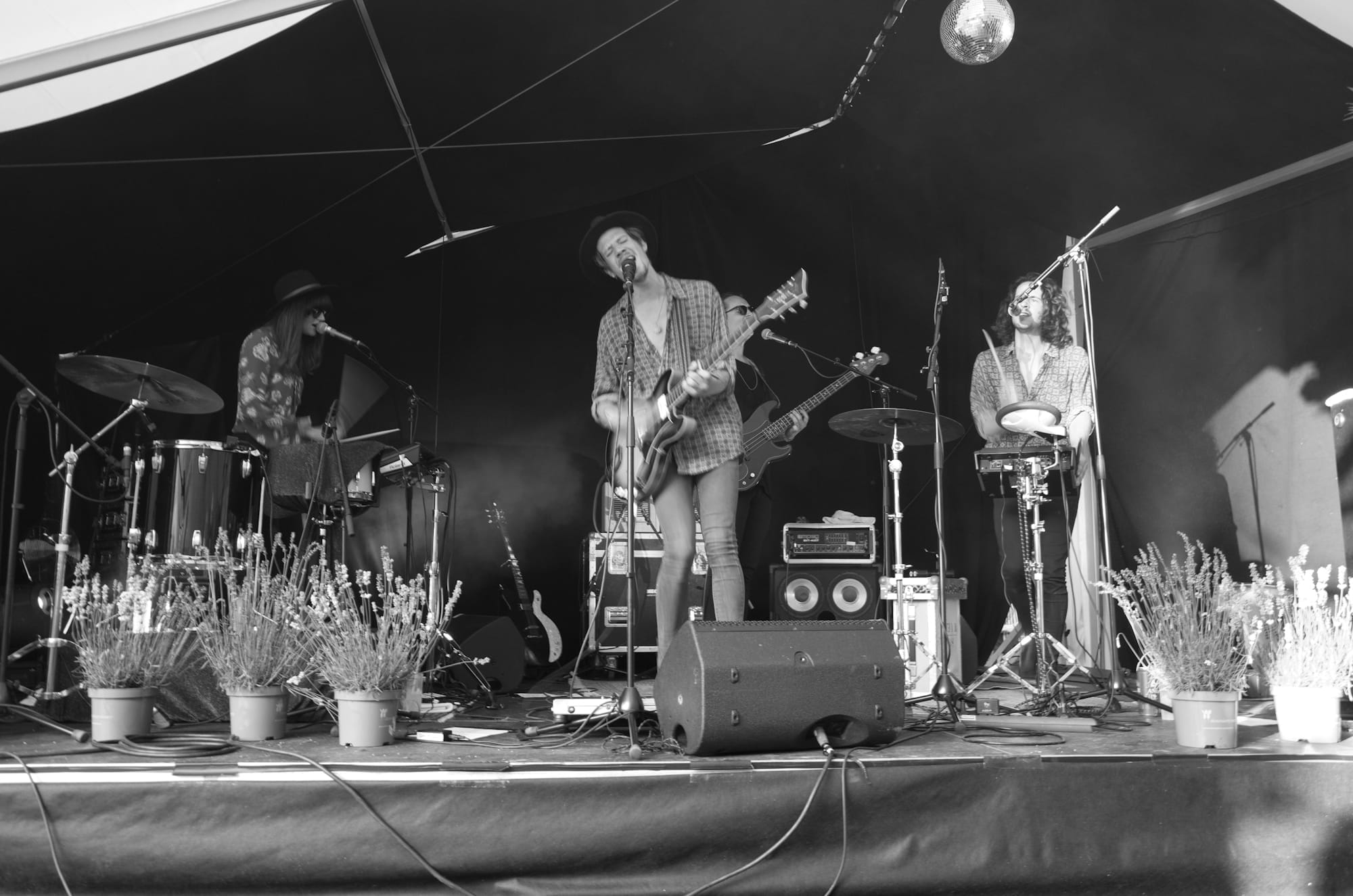Stories
Reports, interviews, essays, and opinions about music and its connection to business and society.
Cheering and Boiling in Zurich
Son Mieux packed the small club Exil in Zurich and turned up the volume and heat to the maximum.
It would get tropically hot on this rainy Thursday night. And a surprisingly large and heterogeneous crowd rushed under umbrellas to the club Exil in Zurich. An evening with Son Mieux was about to go down. The band's heavily disco-styled sound attracted young and old, fashionable and boring business casual, united in their search to flee the dreary everyday life for a short moment.
Then again, the pull of Son Mieux is not too surprising. In the Netherlands, their home country, they will soon play their first stadium shows. A success like that is always going to spill over to other countries.
In the interview with Negative White, however, Son Mieux's mastermind, Camiel Meiresonne, looked forward to the more intimate shows on their European tour: «We can be a band with a big show and grand gestures. The gigs in Holland have become huge, so it's fun to play smaller venues again and find these smaller moments of intimacy.»
Asked what people might expect from their show in Zurich, Meiresonne said what he would sort of repeat on stage later: «We want people to feel that they can simply be whoever they want and feel whatever they want for that night. Life is everything between happy and sad, and I hope our concerts can be a place where you can feel all of it.»
But first, it was on Pat Burgener's shoulders to get the audience cooking. The active professional freestyle snowboarder from Lausanne, Switzerland, has been setting up an alternative career path in music since 2014 with remarkable success. And a portion of the crowd came just to see him.
«I have been sober for four years now. It was a significant process»
Camiel Meiresonne and his band, Son Mieux, are on their way up. Ahead of their concert in Zurich, we spoke to the band's mastermind about disco, sad moments, and his sobriety.
«We met before, right,» Camiel Meiresonne asks on the other end of a video call from his hotel room in Budapest. «It was backstage at a picknick table, right?» The moment, the frontman of Dutch indie-pop sensation Son Mieux recalls, lays way in the past:
It was their first show abroad, at a small open-air in Switzerland in 2016.
«I do remember that gig. We had a little event for our crew and management about a month ago. We had a pub quiz, and there was a question about our first-ever gig abroad.»

Today, almost eight years later, Son Mieux are in a completely different place. In their home country, they sell out huge shows. Their second studio album, The Mustard Seed, was awarded an «Edison», the Dutch equivalent to the Grammys. Shortly after, they released the single Multicolor, which remained the number one spot for most airplay for eight weeks.
Son Mieux currently tours through Europe with concerts in major cities—also in Zurich's Exil club on February 22. Time to catch up before the show.
It has been a while since we last spoke, and a lot has happened for you and the band. Looking back, what are the most significant aspects?
The main thing is that we've actually truly become a band. Back in 2016, everything felt like a solo project. We had the live group, but I was writing and recording the songs. The records we've made and the shows we've played for the last couple of years we have been making as a group where everybody found its place.
Collaborating as a group also has evolved the music. Where things, in the beginning, were more acoustic stuff with electronics around it, now the sound is formed around the people that make up the band. We've been taking our time to find the right sound, the right stories, and the right people. If I look back now, we were not rushed to make it. Step by step, we found the place where we felt comfortable but still excited.
You already touched on the evolving sound. You have developed a certain vintage vibe, a lot of disco feeling. What is it about this sound that fascinates you?
We always look for ways to give our songs a twist. Most of the songs that we write are still folk songs. They are even a bit sad if you play them on an acoustic guitar or a piano. Their themes are not always only positive.
I Switched From Spotify To Apple Music. Was It Worth It?
Spotify is the obvious choice for anyone looking for a music streaming service. However, the company often annoys me despite their undeniably great product. So I tried to switch it up.
About two years ago, I wrote a piece about Spotify and the power of their product regarding design, where I compared the streaming primus with Apple Music. The conclusion then was easy: Spotify has simply the better experience.
However great the product might be, I still dislike the company. The decisions they have made in recent times are at odds with my values as a music enthusiast. Their payout model is abysmal. And yet, as someone writing about music and curating playlists, there is no way around the green goblin.
Also, as a music writer, I already pay for many music subscriptions: Spotify Duo (for my personal and Negative White’s account), Apple Music, and YouTube Music (bundled in with YouTube Premium). They amount to about $60 monthly—not an insignificant amount.
Having this arsenal of streaming services at hand, I once again started the journey of switching my primary service: Goodbye Spotify, hello Apple Music. It has been about a month, and here is what I learned.
Exploring The Fascination For Moyka
Since her debut single in 2019, the author has repeatedly written about Norwegian pop artist Moyka but has never succeeded in scratching more than the surface.
Almost exactly five years ago, Moyka entered my life and playlists and never really left. In March 2019, the then-21-year-old Monika Engeseth released her debut single, Colder. After that, the Norwegian artist became a frequent subject in Negative White's reporting: eight times I featured one of her tracks in Weekly5—more than any other artists.
But in all those years, I have never been able to accurately capture my fascination for Moyka in words. Rereading the short reviews, they only scratch on the outer layers, unable to crack the code and bust open the door to reveal the answer.
The blame may fall onto the music itself: Moyka produces pop music, and that is precisely the opposite of what I usually love. However, between these addictively catchy melodies, there is a pinch of melancholy, even sadness, and a cinematic quality to her songs, coated with a Nordic frost.

Zurich, 8th of February. The day has finally come: It is Moyka's first concert in Switzerland. Marking the end of her first European tour, she would bring her sophomore album, Movies, Cars & Heartbreak (2023), to the stage.
After writing concert reviews for years, I still struggle, even dislike them—especially if the show was great. I believe people have a lifetime quota for superlatives in writing, and I have already used mine. You try to capture the vibe, and sometimes you succeed. But that is more often pure luck. A writer's happy accident.
And there is this other danger lurking: Anticipation. For months, I have been looking forward to the show; for years, I listened to the songs. What if the concert crumbles under the weight of imaginary expectations?
But I had a mission that night: Find the deeper roots of my fascination for Moyka.



There is something inherently unique about small-scale concerts. Around 30 people found their way to X-Tra Musikcafé that night—a relatively small crowd barely filling half of the already tiny venue. But each and every one wanted to be there.
The show started. Already Gone. Already goosebumps.
The evening defied all challenges: The sound, light, and setlist were exceptional. It lasted an hour, but somehow, Moyka's meandering voice took us into a different dimension where time did not exist. Framed by two men on synthesisers and drums, she delivered a mesmerising, otherworldly vocal performance.
However, it was in between the songs that the pieces finally fell into place. «This evening is a space for big emotions,» Moyka told the audience.
Understanding Moyka means appreciating the duality of music and its inspiration. The Nordic crystalline sound of her ethereal pop creates a reserved distance. These angelic hymns seem larger-than-life, reducing one's existence to a tiny spec of dust in eternity. But underneath this cathedral-sized sound, undiluted emotion builds the foundation and pulls you back into the most profound definition of being human.

Once this connection bridges the gap, it all makes sense: We are capable of fiery love, despairing sadness, and profound gratitude. Moyka sounds large because our feelings are overwhelming. Her music becomes a catalyst for recognising and accepting these moments of emotional excessiveness.
I know you're holding your guard up
And I know that you think you're bad luck
But darling, that's not who you are to me
—Moyka - Rear View
Moyka led by example: There was no filter, no stage persona clouding her authenticity. She not only accepted but invited and embraced vulnerability. She spread pure joy. When two people in the audience kissed, her eyes lit up so bright they could convert the devil to a saint.
And we followed. We danced in tender escalation, closed our eyes and dreamed, revelled in delight, escaped reality and received catharsis.



Swiss Band Becomes Victim of AI Scam
Bell Baronets suddenly found that they'd released a new EP. The problem: It's not theirs. What happened?
Bell Baronets are an independent rock band from Switzerland. The trio around guitarist Silvan Gerhard has been releasing music for over a decade—with the EP Mount Yeast Tapes (Side B) being their latest in 2022. They are a small band with currently 574 monthly listeners on Spotify.
However, a new EP suddenly appeared on Spotify and other streaming services. I Will Not Surrender with six new songs. Fans might have been excited, but there's a problem: It's not Bell Baronets.
«My brother wrote me because he had it in his Release Radar on Spotify,» Gerhard tells Negative White over the phone. «At first, I definitely was perplexed and also angry, but the more I think about it, the more I can laugh.» He made the fake EP public on the band's social media profiles.
«I thought the EP got accidentally attributed to us, but then I listened to the songs, and it felt odd. It sounds like us, but not quite. The mix is pretty whack. The voice sounds different in every song,» Gerhard explains. After that, he suspected that it was AI-generated music.
So what happened exactly?
How The Scam Works
A combination of criminal energy and lacklustre controls enabled this fake EP to arrive at Bell Baronets' profiles. The ingredients for the scam are simple: Anyone can sign up for an aggregator like DistroKid. Aggregators act as interfaces to various streaming services like Spotify and ease the digital distribution for artists.
However, you can also attribute your uploaded music to any artist you like on these aggregators. Streaming services and aggregators assume that people naturally want to upload to their profiles.
But how do they get the money?
One would think uploading fake songs to another artist's profile is useless since the money would go to said artists. That's wrong in the case of aggregators since streaming services pay the aggregators, who then pay the people who uploaded the music. And that is, in the case of Bell Baronets, not them.
There is no check from aggregators or most streaming services if the upload, and by extension, the payout for those, are legitimate. These insufficient checks open the doors for scammers who probably deploy their scheme with thousands of artists to make it profitable.
Gerhard mentions that the EP wasn't uploaded to Apple Music as their upload policy is more strict.

«We Won't Be The Last Ones»
For Silvan Gerhard, it comes as little surprise that Bell Baronets were used for the scam. He reckons that the people behind it specifically target smaller bands because it's less likely to be discovered, and legal ramifications are unlikely. «We definitely won't be the last ones where this happens.»
«The insane thing is that I can't get these songs deleted easily,» he explains. It would require a lot of legal trouble, which Bell Baronets can not afford. Although the fake EP has meanwhile vanished from their artist's page on Spotify and moved to a new artist with the same name, there's still continuous damage. If you search for Bell Baronets, the fake songs are the first results.
Here's an actual song by Bell Baronets.
«The whole AI thing is scary, but our example also shows that it's currently not possible to generate an entire EP with any sort of consistency,» Gerhard states. But he admits that it adds challenge for independent artists. According to his distributor, the AI-powered scams are also top-of-mind with Impala, the European indie association. He hopes there will be a solution soon.
📚 Recommended Reads
- Artificial Intelligence Writes About Music
We used ChatGPT to create short descriptions for songs. The results are simultaneously impressive and sobering. - Are We Ready For The AI Future Of Music?
Artificial Intelligence applications are disrupting the music industry at a staggering pace. It raises many legal, ethical, and philosophical questions—and a potentially bleak future.
While the incident is a nuisance for Silvan Gerhard, who earns his living as a session and live guitarist for several Swiss bands, he took the bull by its horns. He turned it into a good marketing opportunity and simultaneously raised awareness for the issues of AI music scams.
